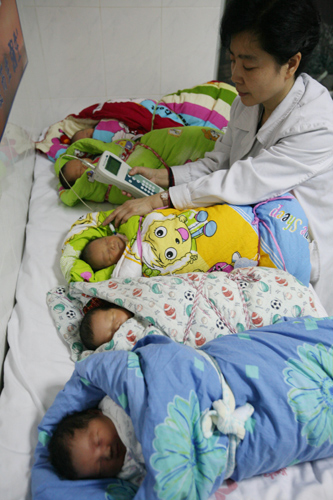Society
Center to study, diagnose birth defects
(China Daily)
Updated: 2011-04-07 08:07
 |
Large Medium Small |
BEIJING - China this year will establish a network meant to prevent birth defects and to ensure the health of infants throughout the country.
Beijing will become home to a national center used to diagnose and research birth defects. The center's main task will be to learn more about the conditions that lead to congenital diseases.
 A doctor examines the hearing of 3-day-old infants in a hospital in Xiangyang, Central China's Hubei province, on March 2. Gong Bo / for China Daily |
Meanwhile, free health examinations will be offered to rural couples and to couples who have moved from the countryside to cities. The tests will be conducted by 220 commissions of population and family planning in 31 provincial-level administrative regions.
Each of the tests will cost 240 yuan ($37), an expense to be covered by special appropriations from the central government and its local subsidiaries.
The birth defect rate in China has shown an upward trend in recent years. Four out of 1,000 infants in China are born with disabilities, according to He Xiyu, director of the birth-defects center that is being built in Beijing. He said congenital heart disease, cleft lip and physical and intellectual disabilities are among the most common birth defects.
Dai Yaohua, a senior researcher with the Beijing-based Capital Institute of Pediatrics and a counselor with the World Health Organization, told China Daily that the advent of the center does not necessarily imply that more children are being born with defects in China.
"The Ministry of Health has established a special network to collect data on congenital diseases," Dai said. He said more is done now to gather information on children born with defects. That in itself would cause the birth-defect rate to rise even if birth defects are not becoming more common in China.
The causes of birth defects are complicated, since genetic conditions, environmental pollution and stressful schedules can all increase the chances that a child will have the defects, Dai said. "But health departments have tried hard to guarantee the health of mothers and children."
The National Population and Family Planning Commission has said it worked closely with the Ministry of Finance in 2010 to start a test program offering free health checks in 100 counties throughout 18 provinces. Another 120 counties have been included in the program this year.
Chang Chun, a professor at the school of public health under Peking University, said couples can improve the chances that they will have healthy children by undergoing health examinations before entering into a marriage or a pregnancy.
"Early pregnancy checkups are necessary to prevent potential disabilities," Chang said. "Many defects can be found without harming mothers."
"But, during our investigation, we found that many pregnant women received their pregnancy checkups too late."
The number of Chinese couples who underwent medical examinations before getting married fell sharply after China, on Oct 1, 2003, ceased making such tests mandatory.
| 分享按钮 |